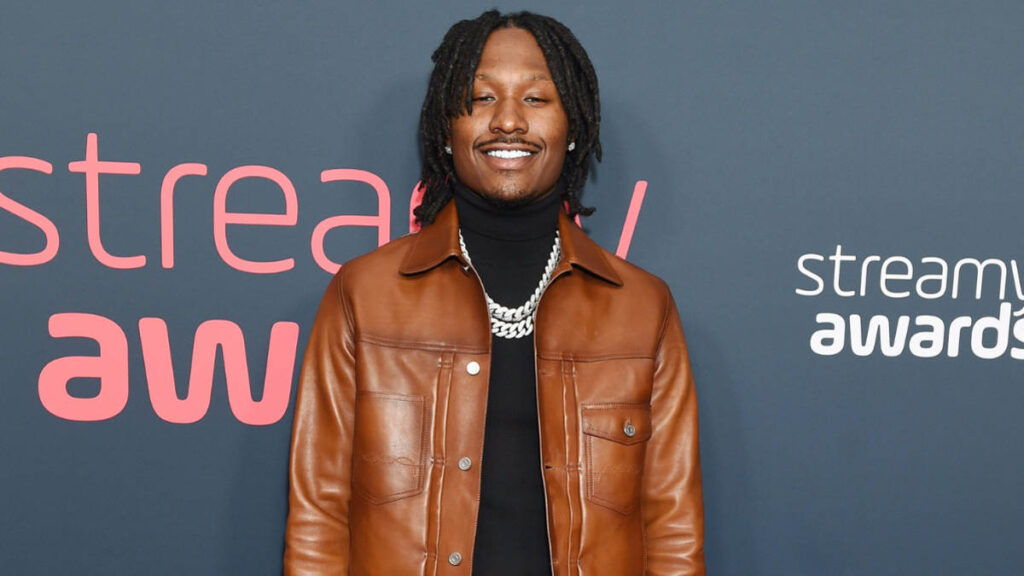Before the sponsorship deals. Before the AMP collabs. Before the millions of subscribers. Duke Dennis was sitting in a barracks room, controller in hand, uploading NBA 2K videos to YouTube with no fancy gear, no clout, and no idea if anyone would care.
They did.
But not because the algorithm handed it to him. And not because a media company saw potential and swooped in with a contract. Duke Dennis built something most people never do — a loyal, engaged, culture-defining audience — without ever needing a greenlight from the gatekeepers.
He didn’t “blow up overnight.” He grew through consistency, unfiltered personality, and a level of authenticity that Gen Z knows how to spot from a mile away. No acting. No polish. No pretense. Just energy, humor, and presence — the kind that turns a 2K match into entertainment, and a hoodie drop into a cultural moment.
And in doing so, he revealed something deeper: the old blueprint for fame and influence is crumbling.
Duke Dennis isn’t just a YouTuber. He’s a prototype for the self-made digital creator. Not mainstream, but major. Not traditional, but trusted. In a world where institutions still struggle to recognize young Black internet talent unless it’s filtered through Hollywood or ESPN, Duke didn’t wait for recognition. He built his signal, and a generation tuned in.
If you want to understand where media, money, and culture are going next, start here.
The No-Label Blueprint — Duke Dennis and the Rise of the Self-Made Streamer
From Barracks to Broadcast: A Brief Origin Story
Before the lights, edits, or subscriber milestones, Duke Dennis was just another young guy in the Army — serving his time, counting down the days, and spending off-hours doing what he loved most: playing NBA 2K. Gaming wasn’t just a pastime. It was an escape, a way to feel in control of something — even when everything else in life felt uniform, structured, and out of his hands.
“I knew I didn’t want to do this forever,” Duke once said in a stream, reflecting on his military days. “So I just started uploading, for real. No expectations.”
His first uploads were raw — no fancy thumbnails, just gameplay and commentary. But there was something there. A spark. Viewers noticed the unfiltered humor, the charisma, the way Duke turned trash talk into performance art. One video caught a little traction. Then another. Before long, he was gaining subscribers faster than he could fully process.
That slow grind from barracks bunk to broadcasting icon wasn’t a pivot — it was a full-on leap. And Duke made it before anyone permitted him.
Building a Brand Without a Blueprint
Duke Dennis didn’t follow a content strategy. He followed instinct.
There was no media team shaping his image, no PR spin smoothing the edges. What you saw on camera — the jokes, the confidence, the random bursts of energy mid-game — was the brand. And that’s exactly why it stuck. In a digital world where creators often polish their personas into lifeless perfection, Duke leaned into his rawness. No script. No filter. Just presence.
He didn’t chase trends — he built trust. Fans didn’t come for high-end graphics or viral stunts. They came because Duke felt like someone they knew. The older cousin at the cookout who talks wild but means well. The friend who wins the game and roasts you after. That cultural familiarity gave him staying power.
What makes Duke’s brand resonate isn’t aesthetics — it’s alignment. His content reflects his real-life energy, and that consistency became credibility. Without a blueprint or a backing label, Duke Dennis became proof that the most magnetic brand you can build is one that never pretends to be anything else.
Algorithms, Audiences & Authenticity: Cracking the Creator Code
What Makes a Duke Dennis Video Work
A Duke Dennis video doesn’t waste time. From the jump, you’re in his world — fast cuts, loud energy, and that signature blend of chaos and charm. There’s no long setup or polished monologue. Instead, it’s “what’s good, YouTube,” and straight into the action. Whether he’s roasting teammates in 2K or reacting to wild AMP challenges, Duke keeps the pace tight and the vibe unpredictable.
His fans expect that balance of hype and humor — the sudden outbursts, the back-and-forth with chat, the genuine reactions that feel unscripted because they are. In his “1v1 IRL Basketball vs Fan” video, the camera work is shaky, the jokes are relentless, and yet the energy never drops. It’s messy in the best way.
What makes his content stick is the rhythm: high-octane, low-production, maximum personality. Duke doesn’t just entertain — he pulls you in, makes you feel like you’re part of the squad, not just a viewer. That’s the formula.
When Personality Becomes Product
Duke Dennis didn’t build his brand around a niche — he is the niche. His content isn’t driven by trends or formats; it’s driven by him. His voice, his humor, his vibe. That’s the currency. And while that kind of creator-brand connection is powerful, it comes with tradeoffs.
When your personality is the product, every video becomes a performance of self. There’s no buffer — fans aren’t just watching content; they’re forming a relationship with you. Duke navigates that parasocial dynamic with surprising grace, often acknowledging his community like close friends. But that intimacy can be exhausting, and risky — especially in Gen Z culture, where authenticity is demanded and performative “realness” gets called out fast.
Still, Duke thrives where many stumble: he stays consistent without becoming a caricature. His fans don’t just watch him; they trust him. And in a digital landscape that’s burning out creators left and right, that trust is the most sustainable asset of all.
The AMP Effect — From Solo Streamer to Collaborative Force
Before AMP, Duke Dennis was already rising — but after joining the group, he became undeniable. Any Means Possible isn’t just a collective of YouTubers; it’s a cultural accelerator. A modern-day boy band for the digital age, built not on music, but energy, friendship, and viral chaos.
AMP isn’t polished. That’s the point. Their house-based content — basketball challenges, skits, debates, pranks — thrives on unpredictability. In videos like “AMP Hide and Seek in a Mansion,” the chemistry is off the charts. Duke’s laid-back confidence contrasts with Kai Cenat’s explosive humor, Fanum’s streetwise charisma, and Chrisnxtdoor’s offbeat antics. Together, they don’t just entertain — they create a shared language for fans.
Collaboration here doesn’t dilute identity; it amplifies it. Duke still shines solo, but within AMP, we see new dimensions: the quick-witted teammate, the instigator, the anchor. These group dynamics fuel content that feels more like a movement than a media product.
In an era where creators often feel isolated by their platforms, AMP proves that community — on-screen and off — isn’t just a strategy. It’s a multiplier. And for Duke Dennis, it’s been a game-changer.
Beyond the Game — Merch, Monetization, and the Modern Creator Economy
Not Just a Hoodie Drop: The Business of Belonging
When Duke Dennis drops merch, it’s not about the hoodie — it’s about being seen. His fans aren’t just buying clothes; they’re buying into a shared identity. The logo on the chest isn’t a fashion statement — it’s a signal: I’m part of this.
That sense of belonging is something legacy brands still struggle to manufacture. Traditional marketing talks at Gen Z; Duke talks with them. His merch drops feel like an inside joke, a moment for the real ones. Limited runs, teased on streams, modeled in chaotic behind-the-scenes clips — it’s messy, fun, real. And that’s exactly why it works.
Where big brands chase clout through influencers, Duke builds connections through community. Every item sold reinforces trust. It’s not commerce dressed up as culture — it’s culture that drives the commerce. In a world oversaturated with stuff, Duke’s brand gives fans something money can’t usually buy: a place to belong.
Passive Bags, Active Streams: The New Revenue Stack
Duke Dennis might make his money on camera, but the real flex is what happens after he logs off. In the creator economy, visibility is just the first layer — what comes next is leverage.
Every YouTube upload earns ad revenue long after it drops. That’s passive income. Every stream on Twitch racks up subscriptions, donations, and sponsorships in real time. That’s active income. Add in merch sales, brand partnerships, and potential investments, and you get what’s known as income stacking — multiple streams flowing from a single source: Duke himself.
Unlike old-school fame, which depended on TV deals or tour dates, today’s digital entrepreneurs build ecosystems. Duke isn’t just a streamer; he’s a business model in motion. He controls the product (his content), owns the platform (his brand), and monetizes every layer — without needing anyone’s permission.
This is the new blueprint: creators who don’t wait for a paycheck — they design one, stack it, and scale it while the rest of the world plays catch-up.
Digital Fame Without the Machine — Why Duke Dennis Stays Off the Radar
Duke Dennis has millions of fans, viral videos, and a rock-solid brand — but you won’t see him on a billboard in Times Square or a talk show couch next to Jimmy Fallon. For someone with his reach, the absence from traditional media isn’t just surprising — it’s telling.
Legacy media still operates through gatekeeping. Fame is often framed through award shows, press tours, and glossy magazine covers. But Duke’s world exists outside that. His fame is decentralized, born in YouTube comment sections, Twitch streams, and meme pages on Twitter. It’s cultural capital, not corporate approval, that keeps his name hot.
This isn’t accidental — it’s strategic. Duke doesn’t need validation from platforms that rarely center creators like him anyway. His core audience, largely Gen Z and deeply rooted in Black internet culture, values realness over red carpets. And that authenticity doesn’t translate well in environments built for polish and pretense.
His low media visibility protects his brand. It keeps him close to the culture that built him. It keeps his voice unfiltered, his platform in his control. While traditional celebrities chase exposure, Duke builds trust — and in the creator economy, that’s the more valuable currency.
So why isn’t Duke Dennis “mainstream”? Maybe the better question is: why does he need to be? When the system overlooks you, you don’t have to fight your way in. You just make something so undeniable that the culture carries it on its own — and Duke Dennis is proof of that.
In Good Company: How Duke Dennis Stacks Up to Gaming’s New Guard
Put Duke Dennis next to Kai Cenat, iShowSpeed, and YourRAGE, and you don’t just get a list of top creators — you get a snapshot of a generational shift. These aren’t just gamers; they’re culture-shapers, entertainers, and community builders operating in a digital space where personality outshines production.
Kai brings manic energy and fast-paced, meme-ready content. Speed is a spectacle — chaotic, unpredictable, viral by nature. YourRAGE leans into commentary, reaction, and layered humor. And then there’s Duke: calmer, smoother, more composed. He doesn’t yell to get attention — he commands it.
His lane is different: less flash, more presence. He’s the anchor in the AMP collective, often playing the straight man to wilder personalities — but that balance is exactly what sets him apart. While others move fast, Duke plays the long game, building trust and consistency that gives his content a slower burn but deeper impact.
Together, they form a new guard of digital entertainers redefining what gaming media looks like — rooted in culture, powered by platforms, and owned by the creators themselves.
| Creator | Dominant Platform | Vibe/Tone | Known For | Fan Culture |
| Duke Dennis | YouTube/Twitch | Cool, confident | NBA 2K, AMP collabs, lifestyle | Loyal, culturally tight-knit |
| Kai Cenat | Twitch/YouTube | Hyper, comedic | Pranks, viral streams | Meme-heavy, hype-driven |
| iShowSpeed | YouTube | Chaotic, explosive | Unexpected antics, IRL moments | Viral, fast-moving |
| YourRAGE | YouTube/Twitch | Chill, witty | Reactions, debates | Niche, analytical |
Why Duke Dennis Matters (Even If You Don’t Watch Him)
The first time I watched a Duke Dennis video, I didn’t get it. I clicked on a 2K gameplay clip because it popped up on my feed, and I remember thinking, “Okay… this is just a guy playing a video game and talking trash.” No elaborate edits. No over-the-top reaction. Just Duke being Duke.
But I didn’t click away.
A few minutes in, I found myself laughing — not because of the game, but because it felt like I was on a late-night Discord call with someone I knew. His delivery wasn’t trying too hard, his humor wasn’t sanitized for sponsorships, and his energy? Pure. That’s when it clicked: this wasn’t content for everyone. It was content for us.
Duke Dennis doesn’t need to explain himself. He doesn’t chase virality — it finds him. He talks like your older cousin, acts like your favorite friend’s big brother, and holds his space like he’s already stamped, even if the mainstream doesn’t recognize it yet. That’s part of his swagger — it’s effortless.
What Duke offers isn’t just entertainment. It’s a sense of recognition. If you grew up in certain neighborhoods, around certain people, you feel Duke before you analyze him. That’s rare in the internet age.
So no, I didn’t get it at first. But once I did, I realized something bigger: Duke Dennis doesn’t need to be explained. He needs to be understood. And that’s why he matters — even if you’ve never watched a single stream.
Lessons from the Formula — What Creators and Brands Can Learn
Embrace the Niche, Ignore the Noise
If there’s one thing Duke Dennis proves, it’s that trying to please everyone is the fastest way to blend in. His success wasn’t built on mass appeal — it was built on specificity. He knew his audience, spoke their language, and never diluted his vibe to fit into broader molds.

Too many creators chase trends instead of trust. Brands cast wide nets hoping for virality, but miss the deeper wins that come from belonging to a culture, not marketing to it. Duke didn’t get loud to compete — he got focused. That’s what made him stand out.
For any rising creator or brand strategist, the lesson is simple: the niche isn’t a limitation. It’s the signal. Tune into it, and your audience will find you — loud and loyal.
Authenticity Sells — But It Has to Be Real
Authenticity is the internet’s favorite buzzword — but most people are just performing it. They sprinkle in slang, show “behind the scenes,” and think that’s enough. But audiences, especially Gen Z, have a sixth sense for the fake.
Duke Dennis never had to perform. What you see in his streams is who he is off-camera — same tone, same humor, same energy. That’s why people stick around. Consistency isn’t just about upload schedules; it’s about showing up the same way, every time.
Social psychologists call it “identity alignment” — when your actions match your values. Duke doesn’t code-switch for clicks. He built his platform on being unapologetically himself, and his audience responds with loyalty.
So ask yourself: is your brand keeping it real… or just keeping up appearances? Because people can feel the difference.
The Duke Dennis Playbook Isn’t a Shortcut — It’s a Signal
Duke Dennis didn’t game the system — he built outside of it. And in doing so, he revealed something a lot bigger than just how to grow a YouTube channel. His story is a signal for where media, influence, and ownership are going: away from gatekeepers, toward the people.
This isn’t a playbook you can copy step-by-step. There’s no script for being you. What Duke shows us is that digital success today doesn’t require mainstream nods, high production, or a million-dollar setup. It requires alignment — between who you are, what you make, and who you serve.
Creators like Duke Dennis aren’t just riding trends; they are the trend. They speak directly to culture, not around it. They build trust, not just traction.
So if you’re watching from the sidelines, thinking you need permission or polish to start — don’t. The blueprint isn’t perfect. Its presence.
And Duke Dennis? He’s already showing us the way.
Mohit Wagh is the co-founder of The Graval with over 10 years of experience in SEO and content strategy. He specializes in crafting data-driven, authoritative content that blends cultural insight with digital growth.





1 thought on “The Duke Dennis Formula: How Gen Z Built a Million‑Dollar Gamer Without the Mainstream”